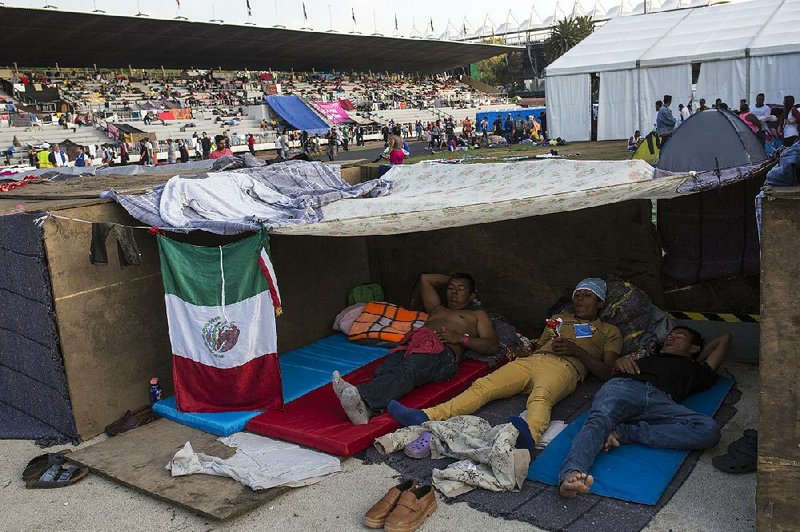MEXICO CITY -- Central American migrants on Wednesday continued to straggle in for a rest stop at a Mexico City stadium, where about 4,500 continue to weigh offers to stay in Mexico against the desire of many to reach the U.S. border.
Mexico City officials said they expected as many as 1,000 more might arrive at the Jesus Martinez stadium as lagging members of the caravan trail in, their journeys slowed by difficulties in getting rides or by hopping aboard trucks that veered off their route.
Angel Eduardo Cubas of La Ceiba, Honduras, reached the shelter early Wednesday after being split off from the caravan. Like many migrants, he had to find his way back to the relative safety of the caravan in an unfamiliar country, with no money.
"There were a lot of people who got dropped off somewhere else," said Cubas, who at one point lost his two children, 2 and 6, before finding them again. "It was ugly, going around looking" for his kids, the 28-year-old father said.
Members of the caravans of migrants, which President Donald Trump made a central issue in U.S. midterm elections, declined to make an immediate decision Tuesday night on whether to stay in Mexico or continue north, opting to remain in the capital at least a couple of more days.
"Nobody is in more of a hurry than me to get going [to the U.S. border], but we have to go all together," said Sara Rodriguez of Colon, Honduras.
Rodriguez, 34, fled her country with her 16-year-old daughter Emily, after the girl began to draw unwanted attention from a drug trafficker who just got of prison and pledged to go after her. Rodriguez left her 7-year-old son with her husband in Honduras. "Even though it hurts to leave my son ... I had to protect her," Rodriguez said, weeping.
Mexico has offered refuge, asylum or work visas to the migrants and the government said 2,697 temporary visas had been issued to individuals and families to cover them while they wait for the 45-day application process for a more permanent status.
Several smaller groups were trailing hundreds of miles to the south; officials estimated about 7,000 in all were in the country in the caravans.
Separately, the Pentagon has directed U.S. military commanders to stop calling the deployment of active-duty troops to the southern border "Operation Faithful Patriot," a name derided by critics as overtly political while Trump played up the mission in stumping for Republican candidates.
The decision was acknowledged Wednesday after the midterm elections, and it was not immediately clear what name the military operation may ultimately take instead.
"We are no longer calling it Operation Faithful Patriot," said a Pentagon spokesman, Army Lt. Col. Jamie Davis. "We are referring to it as border support. I have nothing further at this time."
A second Pentagon spokesman, Chris Sherwood, said that simply referring to the military operation as "border support" is a "more accurate description" because the Department of Homeland Security is overseeing it. The news was first reported by The Wall Street Journal, which said the directive was issued by Defense Secretary James Mattis' office on Election Day. He has sought to shield the military from politics, with mixed results.
The operation, announced Oct. 29, is in support of the Department of Homeland Security and Customs and Border Protection. The Pentagon has sought to stress that it has only a support role, while the president has suggested that the military will face the migrants at the border.
Information for this article was contributed by Maria Verza and Christopher Sherman of The Associated Press; and by Dan Lamothe of The Washington Post.
A Section on 11/08/2018
